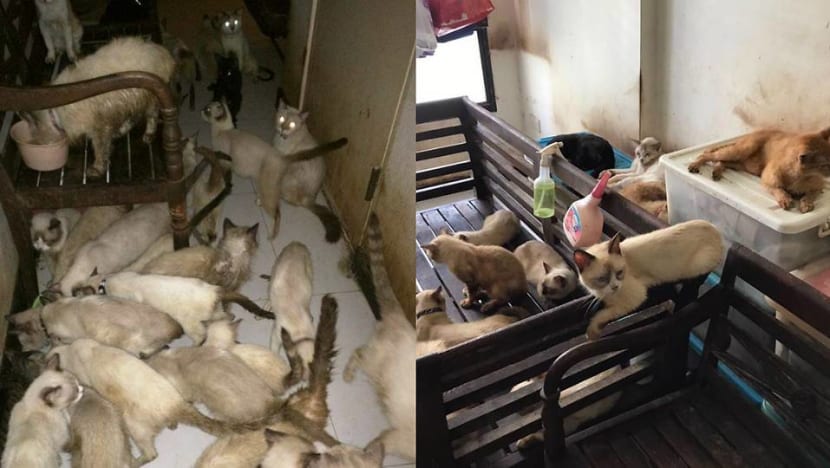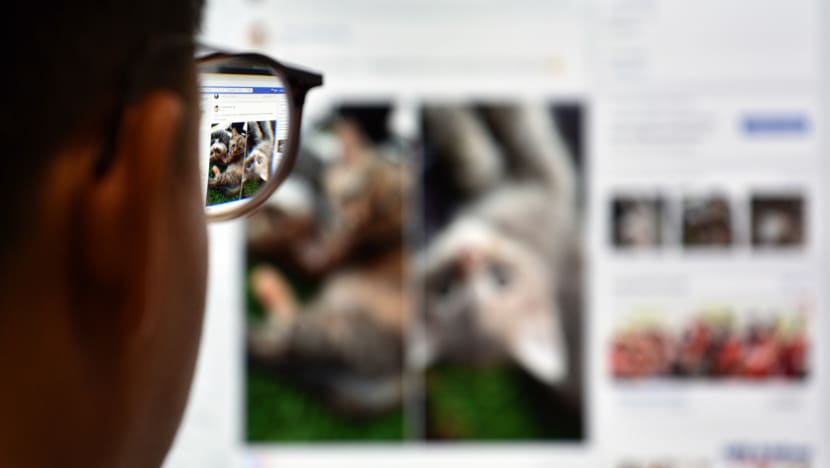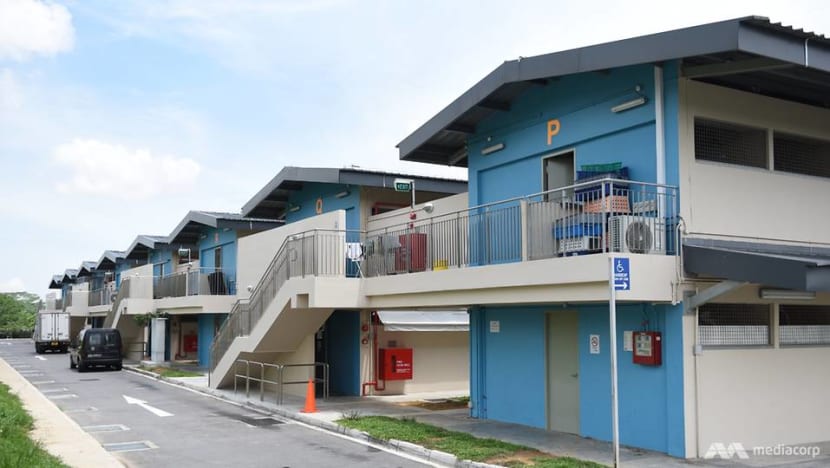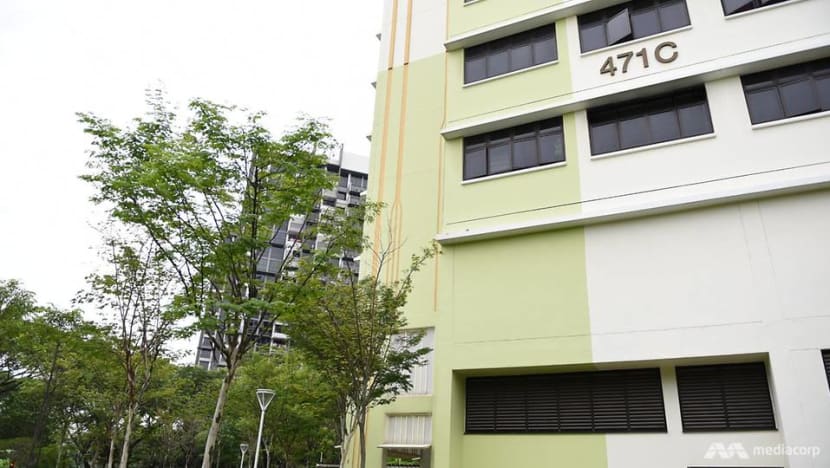Adopt a kitten for S$1,000? Adorable pets in demand from backyard breeders
Prospective pet owners are turning to unofficial breeders who offer kittens and puppies at lower "fees", compared to what licensed breeders or pet shops may ask. CNA investigates how this sometimes secretive world works.

Backyard breeders in Singapore operate in the shadows, evading the authorities. (Illustration: Rafa Estrada)
SINGAPORE: It began with a post in a private group on Facebook, showing off four flat-faced kittens like fluffy balls of black, white and grey.
“All taken,” the post read. “Thank you.”
But all it needed were several private messages, and a day later a middle-aged man swung open the meshed gate of his HDB flat, and with it the promise of an adorable pet.
Sam (not his real name) sat on the bare parquet floor, looking lovingly at three kittens suckling on their mother. They were three weeks old and no bigger than the size of his palm. Two were still available and going for an adoption "fee" of S$1,000 each.
A slightly larger, equally adorable kitten skittered around the living room as the sound of a hairdryer echoed across the hall. The alpha male was getting dried down after a bath.
The felines were part of Sam's fifth litter. He said he’s given up about 15 kittens from the same parents, all bred in the comfort of his own home.
Current regulations are clear. Animal and Veterinary Service (AVS) regulations dictate that a pet farm licence is needed to breed cats for sale. A pet shop licence is also required to display any animal, including cats, for sale.
Sam admits that “it’s not easy getting the licences”.
“This is a hobby for me. We take care of cats because we love them,” he adds.
READ: Pet farm owner fined S$180,000 for neglecting dogs’ health
Sam's kittens were apparently not "for sale". The S$1,000 fee he asks for covers a first round of health checks, vaccinations and de-worming.
In addition, if anything untoward happens to his kittens post-adoption, Sam is constantly on call to help out.
He said he gets worried when when customers stop posting pictures of their new kittens on social media.
“Sometimes when everyone is asleep, I stay out here and play with my kittens,” said the self-employed man, who showed good knowledge of their features and temperament - testament to what he said was 20 years’ experience looking after new-born kittens.
But while he's seen many litters come and go, breeding is a term he was reluctant to use. “I leave it naturally,” he insisted. “Like humans wanting to have kids.”
MORE THAN AN "ACCIDENT"
While Sam's kittens appeared to be well cared for, animal advocates believe this may not be typical of all unlicensed breeders.
Some backyard breeders don’t send their kittens for check-ups or vaccinations before selling them, said independent cat rescuer Joanne Cheong. Kittens not cute enough to be sold are at times abandoned; and when they are not, cat hoarding occurs.
She added that poorly-trained backyard breeders could harm the mother through repeated births, while her offspring might inherit genetic diseases.
READ: 94 cats rescued from 3-room Fernvale flat, AVA investigating
Ms Cheong said she has gone undercover to the homes of about eight suspected backyard breeders in areas like Bukit Panjang, Boon Lay, Punggol and Tampines. While she found living conditions at these homes generally acceptable, the physical condition of some parent cats sometimes told a different story.
“If you know cats and you’ve seen cats, you understand them,” she told CNA, referring to what she sees in their eyes, fur and behaviour. “You can see that some of them are not happy, some of them are not well taken care of.”
While backyard breeding could be bad for animals' well-being, AVS group director Chua Tze Hoong said the practice could also affect public health.
"As animals from non-approved sources, such as smuggled animals or through unlicensed breeding for sale, have unknown health status, there is always a risk of them carrying infectious diseases, which can be spread to humans," he told CNA.

Backyard breeding doesn’t just happen with cats. The practice is “very common” with dogs too, said Mr Derrick Tan, president of Voices for Animals, an animal welfare group which rescues and rehomes retired breeding dogs.
Mr Tan said breeders usually deal in smaller varieties like poodles, malteses and chihuahuas, and advertisements are usually posted in private online groups, mainly populated by owners of these dogs.
Two years ago, his team rescued a family of poodles from a suspected backyard breeder, after its owner posted an advertisement on online marketplace Gumtree.
“The owners kept saying (the litter) was an accident, but they already sold one litter a year ago,” Mr Tan told CNA. “It’s difficult to get them. They will try to cover up and say 'I will sterilise next time'.”
Ms Cheong said backyard breeders are cautious when dealing with prospective buyers, noting that they might screen profiles and pull the plug if things seem amiss.
They also intentionally use the term “adoption with fee” in subtle advertising, she added, to avoid falling foul of regulations.
Furthermore, the animal advocates said these breeders usually operate away from the public eye, often in obscure forums or secret groups on Facebook. The latter are not searchable, and admission requires an invitation from a current member.
TIGHTER RULES NEEDED?
But that does not mean backyard breeders have free rein.
Last February, a 26-year-old woman was fined S$4,000 for breeding cats in her Buangkok flat without a pet farm licence, and another S$2,500 for selling cats without a pet shop licence.
The AVS, then-named the Agri-Food and Veterinary Authority (AVA), found six adult cats and another six kittens in her unit, with investigations revealing the woman had posted on her Facebook page photographs of kittens for sale.
READ: Woman fined for breeding, selling cats from Buangkok flat
Anyone found guilty of operating an unlicensed pet shop is liable to a maximum fine of S$5,000, while anyone found guilty of operating an unlicensed pet farm can by fined up to S$10,000 and/or jailed up to 12 months.
In January, the AVA took action against one cat group on Facebook whose main purpose was believed to be the sale of backyard-bred kittens.
In a message sent to the group’s admin and seen by CNA, AVA said it had received feedback regarding the “sale and adoption of cats through Facebook”, and that it was illegal to do so without a licence.
“We would seek your co-operation as the admin … to educate your followers and to remove all advertisements pertaining to online sale or adoption of pets by 28 Jan 2019,” the authority added.
READ: Want stronger protection for animals? Empower animal welfare groups to carry out enforcement, a commentary
According to Ms Cheong, the group still exists, only now as a secret group.
On her clandestine visits to the breeders, she would capture evidence and report them to the authorities. But not all these cases have been prosecuted due to a lack of crucial evidence, she said.
“The Government needs to be stricter about this and give higher penalties,” she added.
“The enforcement is not strong,” echoed Mr Tan, who suggested measures like the confiscation of dogs involved in cases of backyard breeding.
When it comes to investigating suspected cases of backyard breeding, AVS' Dr Chua said all forms of evidence, including photographic and videographic proof, are "critical" to the process.
"AVS takes all feedback received from the public on illegal breeding of animals for sale and concerns regarding animal welfare seriously, and will look into the cases reported," he added.
THE CHEAP OPTION
In the meantime, backyard breeders continue to thrive amid sustained demand from buyers.
CNA investigations into one cat group on Facebook revealed that in April alone, there was an average of at least one post a day alluding to the sale of backyard-bred cats, based on information in these posts.
A number of these posts were by users who had posted multiple times, each accompanied by photos of different kittens. Many of these posts also had comments from other members indicating their interest.

As for why people turn to backyard breeders, the reasons are usually financial.
Mr Tan said backyard-bred puppies usually go for half the price of those in pet shops.
“It’s the cheap option,” Ms Cheong added. “You get really beautiful cats for 500 bucks a pop. Why not?”
While Sam had asked for a fee of S$1,000, a check with a pet shop revealed that a similar kitten would sell for S$3,200.
READ: Pretty Pets Kennel licensee fined for overcrowding, breaching regulations
One buyer, who only wanted to be known as Emily, told CNA she has seen some “exorbitantly priced” Scottish fold kittens in pet shops. Instead, she paid S$3,000 to a backyard breeder last year for a three-month-old kitten of the same breed.
But for the 29-year-old digital marketing executive, the main draw of the breeder - whom she got to know through a friend - was how well her kittens were cared for.
READ: Pretty Pets Kennel operator fined S$48,000 for not sending sick dogs to vet
“I felt that this home breeder took care of her kittens way better than the pet shop I got my previous kitten from,” she told CNA. “They’ve cared for cats for a number of years now and genuinely do wish for their cats and kittens to go to good homes.”
Emily said she was not hugely concerned that the breeder was unlicensed. Instead, she made the effort to ensure the breeder ran a knowledgeable and proper practice.
The breeder was open to questions, and Emily visited her terrace home to check on the cats’ living and physical conditions.
“You could also see from the disposition of the cats and kittens that they were well cared for,” she added, noting that they were friendly and well-groomed.
A LUCRATIVE BUSINESS
Responsible or not, the animal advocates maintain that many backyard breeders are in it for the money.
While Sam asked for a S$1,000 fee which included a vet check-up, vaccination and de-worming, a check with three animal clinics showed that these usually cost around S$100 in all.
“The practice for all rescuers is that we never go beyond S$200 dollars for the adoption fee,” cat rescuer Ms Cheong said. “People are taking the risk because the money is quick and easy.”
READ: If everyone detests puppy mills, why do they still exist? A commentary
Getting a pet farm licence is not straightforward either.
Prospective licensees would have to submit documents showing the building and landowner’s permission to use the space for farming, as well as the type and dimension of facilities planned for farming activities. They would also need to submit a business proposal for evaluation.
After obtaining an "in-principle, no objection" letter from the AVS, they would then need to seek approval and clearance from relevant agencies where necessary. Before issuing the licence, AVS will conduct a site visit.

The owner of a licensed dog farm at The Animal Lodge in Sungei Tengah told CNA that non-official breeders are putting a dent in the pockets of licensed breeders, especially as he’s seen an increase in their numbers over the years.
“We are running a business,” said the owner, who’s been breeding dogs for seven years and declined to be named. “These people are selling for cheap.”
He also felt that backyard breeders fly under the radar because of their covert tactics.
“I just make sure my dogs get welfare, proper medical treatment and good food,” he added. “You don’t use them as a machine, ill-treat them and get the money to spend on yourself.
“When the AVA officers come, I tell them that outside, there are so many illegal breeders.”
AVS' Dr Chua said the authority has in place conditions for the breeding of dogs, such as age limits concerning when they can start breeding and when they must stop.
"AVS also stipulates the frequency at which they breed, and the length of the rest interval between each cycle," he added. "If such conditions are not followed, the health of the parents and their offspring will be affected."
CONFLICTING PERSPECTIVES
On a cool Sunday evening, we met another backyard breeder at a void deck in north-east Singapore.
Dan (not his real name), who cradled a three-month-old brown poodle, had also brought along the father of the precocious pup - trotting obediently on a leash held by his wife. Dan claimed to be a former pet shop owner.
Early in our conversation, he emphasised that his canines were well cared for. Their enclosures were cleaned every day, and the S$2,000 fee being asked for included a first round of vaccinations and microchipping.
Dan showed us a vaccination card; two vouchers for future vaccinations would be thrown in for good measure.
When asked about the puppy’s parents, Dan said the mother was a friend’s female dog he borrowed for breeding. This dog had already given birth to three litters, and this puppy was the last to be sold. Breeding stops after the third litter, he stressed.
“I will guide you through till the puppy is eight months old,” he said. “I have a lot of customers who still contact me. You don’t have to worry. Some even introduce customers to me.”

But Dan warned that not all backyard breeders were trustworthy.
“Those who post ads online, if they can’t produce the parents, you better not buy,” he said. “Where did they get their puppies from? There are question marks there.”
The business of backyard breeding is clearly controversial.
Back at her flat, Ms Cheong kept Chewie - her affectionate, rescued ginger cat - close to her chest.
“The layman doesn’t see the consequences of illegal backyard breeding,” she said. “You see it on the superficial level: ‘Oh pretty, beautiful cats, so cute.’ (But) it’s horrendous, the things they are doing.”
For Dan, it’s business as usual.
“He’s very smart,” he said, stroking the puppy’s apricot brown fur. “Training him will be very easy. He can be a show dog in the future.”
















